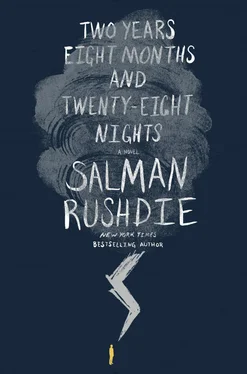He thought of her monologues the way music lovers thought of beloved songs. They had provided their own kind of musical accompaniment to his life. His days had fallen silent now but his nights, some of them at least, still bulged with her words. But now he was awake and there was a woman standing over him and here was another impossible thing to set alongside the impossible thing his life had become, maybe this was an even more impossible impossibility, but he could recognize her body anywhere, even in the dark. He must have entered some sort of delirium, he thought, maybe he was at the end of his life and in the chaos of his last moments he had been granted this vision.
Ella? he asked. Yes, came the answer. Yes and no.
He turned on the light and jumped, if not out of his skin, then at least out of bed. Out of his supine position four inches above his mattress. His blanket fell away. And, facing mutated Dunia, now the spit and image of Ella Elfenbein Manezes, he trembled with true fear and the birth of an impossible joy.
They couldn’t stop looking at each other. They were both looking at reincarnations, both falling in love with surrogates. They were not originals but copies, each an echo of the other’s loss. From the beginning each knew the other to be a counterfeit, and from the beginning each was willing to suppress the knowledge; for a while, at least. We live in the age of coming after, and think of ourselves not as prime movers, but consequences.
“My wife is dead,” said Mr. Geronimo, “and there are no ghosts, so either I am in the grip of a hallucination or this is a cruel prank.”
“The dead don’t walk, that’s true,” Dunia replied, “but the miraculous exists.”
“First levitation,” he said, “and now resurrection?”
“As to levitation,” Dunia coquettishly answered, rising to his level, and inducing, in Mr. Geronimo, a loud, old-fashioned gasp, “two can play at that game. And as to resurrection, no, not exactly.”
He had been trying hard to cling to his belief in the reality of the real, to treat his own condition as exceptional, and not a sign of a more general breakdown. The magic baby on television, whose existence had at first comforted him, had soon begun to worsen the disturbance in his spirit, and he tried to force her out of his thoughts. He had stopped listening to the news. If there were more surreal manifestations being reported, he didn’t want to know about them. Solitude, uniqueness, these things had come to feel more desirable than the alternatives. If he could accept that he alone was or had become an aberration, a freak, then he could also still define the rest of the known world, the city, the country, the planet, by the known or credibly hypothesized principles of post-Einsteinian science, and could therefore dream of his own return to that lost, that yearned-for state. Aberrations occurred even in perfect systems. Such phenomena need not indicate the total failure of the system. Glitches could be unglitched, rebooted, fixed.
Now, confronted by Ella risen from the dead, he had to let go of that last scrap of hope, of what he had thought of as sanity, for here was Ella revealing herself as Dunia, princess of the jinn, who had adopted his wife’s appearance to please him, or so she said; but perhaps it was to deceive him, to seduce and destroy him as the sirens destroyed mariners, or as Circe did, or some other fictional enchantress. Here was Elladunia, Duniella, in his beautiful wife’s beautiful voice telling him wonder tales of the existence of the jinn, bright and dark, fairies and Ifrits, and of Fairyland, where the sex was incredible, and of metamorphs and whisperers; and of the breaking of the seals, the opening of the slits in reality; the first wormhole in Queens (there were more now, all over the place), the coming of the dark jinn and the consequences of their arrival. He was a skeptical and godless man and this kind of story unleashed a churning in his stomach and a sort of babbling in his brain. I’m losing my mind, he told himself. He no longer knew what to think, nor how to think it.
“The fairy world is real,” she said soothingly, listening to his inner confusion, “but it does not follow that God exists. On that subject I am as skeptical as you.”
She was still in the room, going nowhere, floating in the air just as he was, allowing him to touch her. He touched her first to see if he could touch her, because there was a part of his brain that believed his hand would pass right through. She was wearing a black tank top he actually remembered, a black tank over cargo pants like a photographer in a combat zone, her hair pulled back in a high ponytail, and there were her lean muscular bare arms, olive-skinned. People had often asked Ella if she was Lebanese. His fingertips touched her arms and felt warm skin, familiar to his touch, Ella’s skin. She moved towards him and then it was impossible for him to resist her. He became aware that there were tears streaming down his face. He held her and she allowed herself to be held. His hands cradled her face, and suddenly, unbearably, it felt wrong. Her chin: an unexpected lengthening. You’re not her, he said, whoever or whatever you are, you’re not her. She listened beneath his words and made an alteration. Try again, she said. Yes, he said, his palm curved tenderly under her jaw. Yes, that feels good.
At the beginning of all love there is a private treaty each of the lovers makes with himself or herself, an agreement to set aside what is wrong with the other for the sake of what is right. Love is spring after winter. It comes to heal life’s wounds, inflicted by the unloving cold. When that warmth is born in the heart the imperfections of the beloved are as nothing, less than nothing, and the secret treaty with oneself is easy to sign. The voice of doubt is stilled. Later, when love fades, the secret treaty looks like folly, but if so, it’s a necessary folly, born of lovers’ belief in beauty, which is to say, in the possibility of the impossible thing, true love.
This man in his sixties, detached from the earth from which he had made his living, torn away by a lightning bolt from the only woman he had ever loved, and this princess of the otherworld, nursing in her bosom the memory of a centuries-old loss, across an ocean, far away, were both in pain, the unique anguish born of lost or broken love. Here, in a darkened basement bedroom in a house called The Bagdad, they agreed with themselves and with each other to renew two loves destroyed long ago by Death. She took on the clothing of his beloved wife’s body, and he chose not to notice that Dunia’s voice was not Ella’s, that her manner was not his wife’s, and that the shared memories that unite a loving couple were largely missing from her thoughts. She was a magnificent listener and had set herself the task of being the woman he wanted her to be, but, in the first place, listening takes time and care and, in the second place, a jinnia princess wants to be loved for herself, and so the desire to be loved as Dunia fought with her attempt to impersonate a dead woman and made the simulacrum less perfect than it might have been. And as for Geronimo Manezes, yes, she admired his strong, lean, old man’s physique, but the man she had loved had been all mind.
“What do you know,” she finally asked him, “about philosophy?”
He told her about the Lady Philosopher and her Nietzschean, Schopenhauerian pessimism. When he mentioned that the name of Alexandra Bliss Fariña’s home was La Incoerenza, Dunia drew in her breath sharply, thinking of the battle of the books that had taken place long ago between Ghazali and Ibn Rushd, The Incoherence of the Philosophers versus The Incoherence of the Incoherence. Here was a third incoherence. Dunia saw, in coincidence, the hidden hand of kismet, which was also karma. Destiny was in that name. In names are concealed our fates.
Читать дальше












